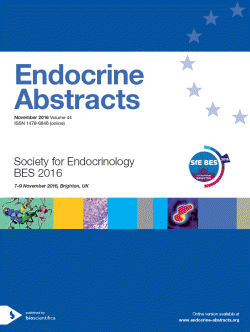Searchable abstracts of presentations at key conferences in endocrinology

Society for Endocrinology BES 2016
Brighton,
UK
07 Nov 2016 - 09 Nov 2016

07 Nov 2016 to 09 Nov 2016
Brighton, UK
Further information
Symposia
Grappling with the future of anti-inflammatory steroids
ea0044s2.1 | Grappling with the future of anti-inflammatory steroids | SFEBES2016
Designer drugs: uncoupling the beneficial and harmful effects of glucocorticoids
Glucocorticoid receptor (GR) agonists are amongst the most effective anti-inflammatory drugs available. These drugs are used in the treatment of a wide range of inflammatory and autoimmune diseases, and for the clinical management of cancer and organ/tissue transplantation. Unfortunately, the full clinical potential of these drugs has not been achieved, especially upon chronic use, due to the occurrence of side effects and/or resistance. The past years, most attention has focu...
ea0044s2.2 | Grappling with the future of anti-inflammatory steroids | SFEBES2016
Combination therapies that lighten the glucocorticoid load
We ask that you provide an abstract of your lecture by using the online submission system. Please click here to create an account and, when asked, please submit your abstract under the INVITED SPEAKER category. Abstracts should be submitted in order for it to be included in the Journal Endocrine Abstracts. Any talks which do not have an abstract submitted will appear in Endocrine Abstracts with the phrase abstract unavailable. Abstracts should be no longer...
ea0044s2.3 | Grappling with the future of anti-inflammatory steroids | SFEBES2016
Effective delivery of anti-inflammatory glucocorticoids is a matter of timing
Gibbs Julie , Loudon Andrew , Ray David
The circadian clock is a key regulator of immune responses. Both circulating and resident immune cells possess intrinsic timers, which act to impart time-of-day variation in their function. It is now becoming evident that the circadian clock is also critically involved in regulating the function of endogenous anti-inflammatory glucocorticoid hormones. Consequently, we see variation in an animals inflammatory responses dependent on the time the stimulus was delivered. Thi...



